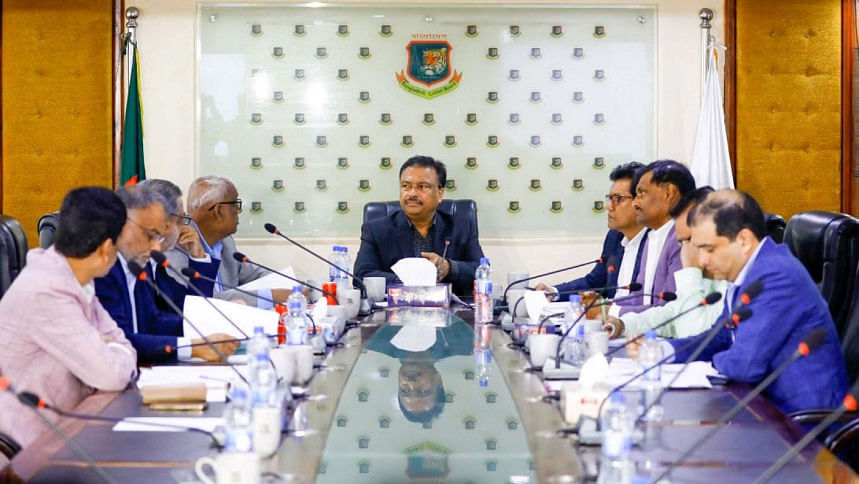The curious case of BCB directors’ no-confidence motion

Faruque Ahmed ascended to the presidency of the Bangladesh Cricket Board (BCB) after the July uprising, with the onus of reforming the board from the inside. But his tenure ended in a little over nine months before the reform initiative could even begin.
Plenty of whispers and theories surround his departure, but what truly led to his premature departure remains a question with no clear answer and the official explanation only deepens the mystery rather than providing clarity.
Nine months into his presidency, managing the board's day-to-day affairs had seemingly become too much for Faruque; let alone delivering on the long-term vision he had promised.
The situation, both on and off the field, was dismal. The national team was struggling, allegations of match-fixing were circulating, and administrative disarray was widespread in domestic cricket-- all reminiscent of the dysfunction Faruque had vowed to fix.
Were these the reasons behind his downfall?
One must put aside the speculation and drama, and turn to the official version.
The National Sports Council (NSC) cited two reasons for cancelling Faruque's directorship:
1. A no-confidence motion submitted by eight current BCB directors.
2. The need to maintain the smooth operation of the BCB following the findings of the Bangladesh Premier League (BPL) fact-finding committee report.
So, two issues: the no-confidence motion and the BPL controversy.
The no-confidence motion accused Faruque of autocratic leadership, repeated constitutional violations, misuse of power and unilateral decision-making. Furthermore, the directors claimed his conduct created administrative chaos, worsened team performance, and caused serious reputational harm to Bangladesh cricket.
The eight directors who signed the letter sent to the ministry were: Nazmul Abedeen Fahim, Fahim Sinha, Saiful Alam Swapan Chowdhury, Iftekhar Rahman Mithu, Mahbub Anam, Kazi Enam Ahmed, Manjur Alam and Mohammad Salahuddin.
The irony? Except for Nazmul Abedeen Fahim, who joined the board with Faruque after the fall of the Awami League government on August 5, 2024, the rest were part of the previous BCB regime under long-serving president Nazmul Hassan Papon.
Did any of these individuals ever speak out against Papon's administration the way they now have against Faruque?
Take Mahbub Anam, for instance — often referred to as "a man for all seasons" — who has been a fixture in BCB governance under almost every government. Has he ever publicly opposed the wrongdoing of any previous administration?
Some might argue that Faruque accomplished more — or at least shook the status quo harder — in nine months than Papon did in over a decade.
It is also worth noting that within Faruque's board, BCB Tender & Purchase Committee Chairman Mahbub and BCB Finance Committee Chairman Sinha were both signatories authorising banking transactions.
This raises a fundamental question: why should only one individual be held solely responsible for alleged misdeeds, especially when others were actively involved in the decision-making process?
Governance-- particularly in a complex organisation like the BCB—is a collective responsibility. If missteps occurred, surely those who participated in or endorsed key actions must also be held accountable.
Singling out Faruque while exonerating others who were part of the very same system points to selective justice — and possibly a political maneuver rather than an objective evaluation of performance.
For the first time in BCB history, board directors openly rebelled against their president. And tellingly, those leading the charge were deeply embedded in the previous regime.
The irregularities and unethical practices Faruque was accused of were embedded in the system during the previous regime, of which majority of the current directors were a part of. If Faruque is being held culpable for it, why not them?
Even more ironically, the current authority acted against its own nominated president based on allegations made by directors from the former board.
Then there's the BPL issue. If the controversy surrounding the tournament was serious enough to bring down a president, why was Faruque the only one held accountable? Why was Nazmul Abedeen Fahim—BPL's member secretary-- not implicated?
Instead, Fahim was promoted to vice-president under new BCB president Aminul Islam Bulbul.
Why were two individuals involved in the same matter treated so differently?
The question that continues to loom large is whether Faruque received fair treatment from the higher authorities. Because, despite the seriousness of the charges, no detailed explanation or concrete evidence was ever made public before his dismissal.

 For all latest news, follow The Daily Star's Google News channel.
For all latest news, follow The Daily Star's Google News channel. 








Comments